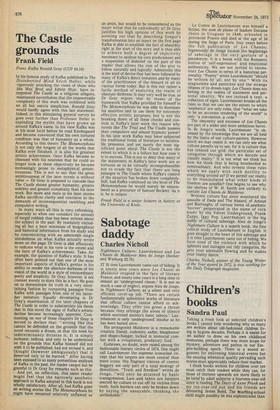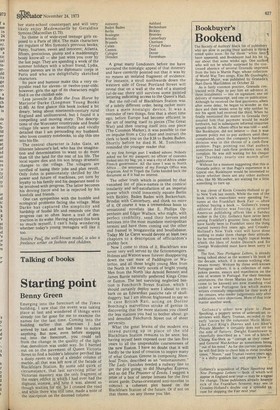Children's books
Sandra Paul
Taking a fresh look at selected children's books I cannot help wondering why so many are written about old-fashioned children living in bygone decades. Perhaps it is easier for an author to draw on his own childhood memories; perhaps there was more scope for mystery, adventure and pathos in our Empire-building epoch. There is a sound argument for enlivening historical events but the ensuing whimsical quality pervading such stories must appreciably reduce their market.
I think books written for children over ten must catch their readers while they can, for those of thirteen upwards are more likely to be lured by adult subjects: a fourteen-year-old niece is reading The Diary of Anne Frank and my ten-year-old son and his friends are devouring James Bond. The boaeding-school child might possibly be less sophisticated than her state-school counterpart and will very likely enjoy Mademoiselle by Geraldine Symons (Macmillan £1.75).
Its theme is of wide-eyed teenage girls exposed to a Paris of 1914. The main characters are regulars of Mrs Symons's previous books; Pansy, fourteen, sweet and innocent; Atlanta, fifteen, precocious, plump and a maddeningly bossy know-all — she just wins you over by the last page. They are spending a week of the summer holidays with a school friend, Lydia, whose parents are in the diplomatic corps in Paris and who are delightfully sketched, characters.
Its pace and humour make this a very enjoyable read for elevenor twelve-year-olds; however, girls the age of its characters might find it on the childish side.
Less juvenile is Ride the Iron Horse by Marjorie' Darke (Longman Young Books E1.60). At first glance this book looked a bit dreary, being about nineteenth-century rural England and unillustrated, but I found it a compelling and moving story. The descriptions of the Worcester countryside and feudal village life were so beautifully and vividly detailed that I am persuading my husband, who loves country notebooks, to slip this one into his file.
The central character is John Gate, an illiterate labourer's lad, who has the imagination and determination to want to do more than till the land for the rest of his life. The local squire dies and his son brings dramatic changes to the village. The villagers are terrified of losing their jobs and plan revolt. Only John is passionately thrilled by the power and future of machines, yet torn by loyalty to his family and his desperate need to be involved with progress. The latter becomes his driving force and he is rejected by his kinsfolk and friends.
One can sympathise with the humble and ecological problems facing the village. Miss Darke has captured the simplicity and hardship of feudal life and reminds one that progress can so often leave a trail of destruction in its wake. Having enjoyed this book so much myself, I can't help wondering whether today's young teenagers will like it too.
Sandra Paul, the well-known model, is also a freelance writer on fashion and children.



































 Previous page
Previous page